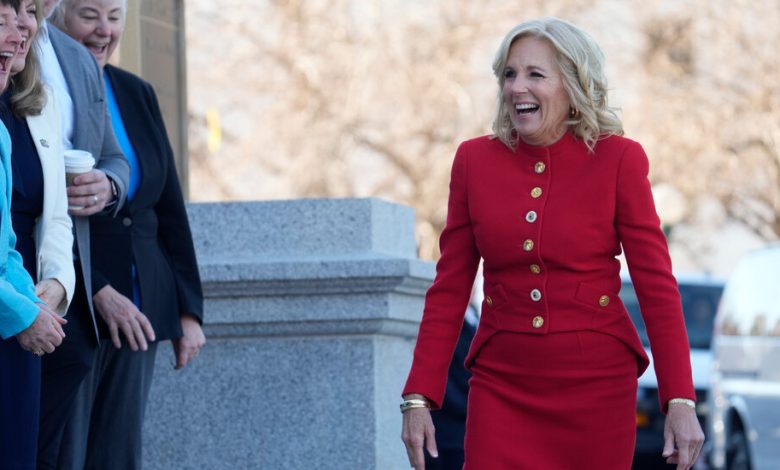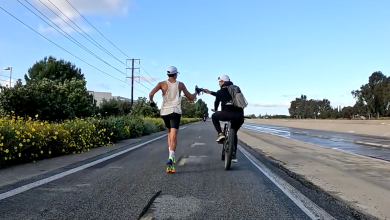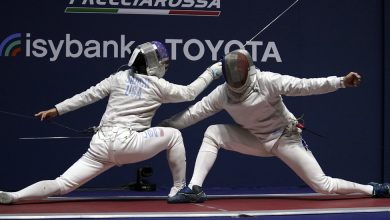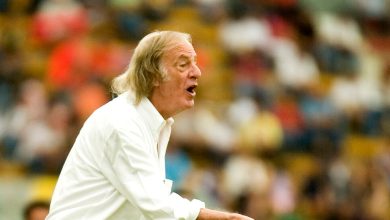Jill Biden Stumbles by Inviting N.C.A.A. Winners (and Losers) to the White House

WASHINGTON — It was, to borrow from sports parlance, an unforced error.
Jill Biden, the first lady, attended the N.C.A.A. women’s championship game last weekend, sitting in the stands with college basketball players and telling them about how far female athletes had come. On Monday, she was still so excited that she said she hoped to invite Louisiana State, the team that had wrested the title from Iowa on Sunday, 102-85, to the White House.
“But, you know,” she added, “I’m going to tell Joe I think Iowa should come, too, because they played such a good game.”
And with that, Dr. Biden stumbled into the fraught tradition of White House sports invitations, which have become more politicized by the year as the forces of race, social justice, gender and politics continue to reshape the realms of athletics and fandom.
Sports fans, newscasters and the athletes themselves quickly pointed out to the first lady that White House invitations were only to be extended to winners. But the game was about more than just who won and who lost.
The story featured Angel Reese, the star forward for L.S.U., who led her team’s efforts to topple Iowa and their premier guard, Caitlin Clark. Ms. Reese is Black and Ms. Clark is white. And Ms. Clark, the consensus national player of the year who used a dismissive hand gesture to antagonize her opponents, never took as much criticism for her behavior as Ms. Reese did for brandishing her championship-ring finger to Ms. Clark during the title game, as the Tigers pulled away to win.
“If we were to lose, we would not be getting invited to the White House,” Ms. Reese said on a podcast. She indicated on Tuesday that she would not accept an apology anyway and left it an open question whether she would visit the White House. “We’ll go to the Obamas. We’ll see Michelle; we’ll see Barack,” she added.
Her comment dismissed the cleanup effort conducted on behalf of Dr. Biden, a first lady who makes few public mistakes but whose missteps have drawn rebukes from vocal groups who have said she lacks cultural knowledge.
Last summer, she was criticized by Latino groups when she compared the diversity of the Hispanic community to the breadth of breakfast taco options available in Texas. In 2021, she botched the Spanish saying “sí se puede”during a visit to the first headquarters of the United Farm Workers of America.
Katherine Jellison, a historian who studies first ladies, said the current role, which has no formal expectations, was surrounded by more cultural land mines than in years past, both because of the immediacy of the social media response and because of the array of platforms available to critics.
“I would just say there is more awareness and also more ways to comment through social media as well as traditional media,” Ms. Jellison said. “In that way, it’s definitely a new ballgame.”
Both Ms. Clark and Ms. Reese have given multiple interviews about the White House invitation, with Ms. Clark saying she did not believe runners-up should attend. And Ms. Reese has been particularly vocal on Twitter, calling the first lady’s invitation to both teams “a joke” and retweeting a message from the sportscaster Chris Williamson: “Your apology should be as loud as your disrespect was.”
On Tuesday, Vanessa Valdivia, the first lady’s press secretary, said Dr. Biden was trying to spotlight all female athletes when she suggested inviting both teams.
“The first lady loved watching the NCAA women’s basketball championship game alongside young student athletes and admires how far women have advanced in sports since the passing of Title IX,” Ms. Valdivia wrote on Twitter, referring to the landmark 1972 law that prohibited gender discrimination in sports. “Her comments in Colorado were intended to applaud the historic game and all women athletes. She looks forward to celebrating the LSU Tigers on their championship win at the White House.”
The first lady has invited female athletes to the White House before, and has used those invitations to highlight issues surrounding equity in sports. On Equal Pay Day in 2021, she delivered remarks alongside Megan Rapinoe and Margaret Purce of the U.S. women’s soccer team, both of whom have been vocal in pushing for female athletes to be paid the same amount as male athletes.
“You know I’m old enough that I remember when we got Title IX. And we fought so hard, right? We fought so hard,” Dr. Biden said in her remarks on Monday. “And look at where women’s sports has come today. So we got to keep working. We got to keep working.”
Sports teams began visiting the White House in 1865, when President Andrew Johnson welcomed baseball’s Washington Nationals and Brooklyn Atlantics. And in recent years, some athletes have forgone the ceremonial visit in exchange for the opportunity to share their views on the invitation — or the president.
The golfer Tom Lehman once turned down an invitation from President Bill Clinton, whom Mr. Lehman called a “draft-dodging baby killer.” In 2012, Tim Thomas, a goalie for the Boston Bruins, skipped a championship ceremony hosted by President Barack Obama because, he said, “the federal government has grown out of control.”
No president has drawn more protests than Donald J. Trump, who was also known to rescind invitations if he received word that athletes planned not to attend. In 2018, he revoked an invitation to the Philadelphia Eagles over a debate about players kneeling during the national anthem at games.
On Tuesday, President Biden said both the men’s and women’s basketball champions would be invited to the White House. (No word on Iowa, though.)
“We can all learn a lot from watching these champions compete,” Mr. Biden said on Twitter, adding, “I look forward to welcoming them at each of their White House visits.”




